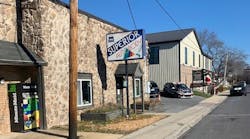When Jeff Brewer took over Scott Auto Body in Charlotte, N.C., he decided he wouldn’t follow the trend of courting DRPs. Instead, he focused on attaining manufacturer certifications. Seven years later, his shop is a certified specialist for seven manufacturers, and Brewer has carried his outside-the-box thinking to all facets of life as a business owner.
Back when I got into the automotive industry in the early ’80s, the first business owner I worked for told me something that has always stayed with me: If you’re going to start a new business, you first have to identify something that no one else does or wants to do. Then you have to find a way to not only create a volume of that, but become good at it. That’s when other doors and opportunities will open.
My passion has always been to build a better mousetrap, a better mechanism, a better customer service company. I started my own company in Texas when I was 25 years old before selling that company nine years later and going to work for various consolidator companies. That’s really where I honed my financial skills and business management skills.
Through the years, I started to notice that customer service and ownership were really lacking in the consolidation models. Eventually in 2006, I decided I would be a much happier person if I were doing this for myself. So, my business partner and I purchased a local Jaguar dealership’s body shop, Scott Auto Body. I wanted to deliver a better service—one that was more in-tune with the times, the customers’ needs, and the technology.
Around the time I started looking for a shop to buy along the mid-Atlantic seaboard, a friend was working for a dealership body shop back in Texas. He told me he was shocked by not only the quality of the work and the service, but the fact that the customer kept coming back because that’s where they bought the car.
That planted the seed in my thought process about combining the robust and aggressive nature of an independently owned, you’re-going-to-succeed-or-you’re-going-to-starve shop with the loyalty and draw that a franchise or dealership enjoys from having sold that original car. I thought if you could combine those two, you would have the perfect formula. That was the first step in understanding and doing what we have now.
So that was already in my mind when I purchased this shop. When we bought the business, the shop had just started the process of becoming certified to do aluminum repair for Jaguars. We worked really hard for the next 12 months to finish that certification and we became the only authorized repair center for any aluminum structural repair for Jaguar in a four-state area.
Things were going pretty well for the first couple of years, but then Jaguar ran into a period where they weren’t selling many cars. We had all this expertise, equipment and dedicated bays but barely any cars to work on. I’m not one to ever look to someone else to solve my problems or as the reason for my failures, so I started asking myself what we could do differently. The first thing that came to mind was that we needed another aluminum car to work on.
We decided to start working on the Audi certification, but because of Audi’s strict criteria, only the all-model, steel certification was available. We worked on getting that certification for two years. Four years later, we finally got the opportunity and the invitation to become certified to repair Audi aluminum cars, too.
From there, a few things started falling into our lap. We became certified for Aston Martin, and the Nissan GTR. That’s when we started calling that segment of our business the high technology solution, because now we’re talking about not just aluminum, but aluminum alloys, carbon fiber, steel, and brand-new composites.
The process to become certified is extremely difficult. You first have to be nominated by a dealership of that brand. If the dealership doesn’t have a need, they won’t be compelled to nominate you. Then you go through a series of qualifications; in almost every case, you must be I-CAR Gold Class Professional.
After that, you have to read through their agreement, their expectations and the equipment they require. Once you agree to all of those, you’re subject to a physical audit. Someone representing the manufacturer will look at your shop, the location, the cleanliness, the service bays, and the equipment.
The last step is that you have to meet varying degrees of training compliance. For example, Volkswagen requires a European standard welding test. I just sent a technician over to England for an Aston Martin carbon fiber training. It’s not about buying the manufacturer’s business. It’s about showing them your product and the manufacturer deciding if it’s up to their standards.
It can take up to a year just to be recognized, and once you’re certified, your shop’s CSIs are tracked on a monthly basis and you’re often re-audited every year or two. You really have to make a commitment to the training and the certification. In essence, you’re changing your business model and your whole existence.
Once we’ve become certified, it’s my job to develop a great relationship with the dealership that sells that brand. They’re not just going to start sending customers to us.
Here’s what you have to remember: The dealership that doesn’t have its own body shop has every body shop in town stopping by once a week to drop off donuts and ask for work. The relationship has to go deeper than that; I have to become a problem solver for that dealership. You’ve got to endear yourself to them and help them solve their problems.
Sometimes it can take up to two or three years of being persistent, staying in the back of the dealer’s mind, and always trying to send a positive message. In one dealership, I have a full-time employee who reports there every day for work. He works on their service drive, greets customers, looks at vehicles in need of work, offers solutions.
We’re steadily trying to carve our place in this market and grow this model. Right now we have two locations but we would like to have four to six in this market. To do that, we really target our marketing and our existence to certain brands that we’ve identified.
We’re very methodical in the manufacturers we seek certification with. We first see if there’s an opportunity in our market, the availability of a certification program, the integrity of that program, and if there’s a dealership that would benefit from this relationship. If that all checks out, we take a deep dive into the brand. We identify a service writer and technician who only work on that brand.
In turn, our marketing is completely brand specific. Our message is that we speak Audi, we speak Volkswagen, etc. Our brochures, for example, are printed specifically to the brand. So it doesn’t say “Scott Auto Body.” It says “Scott Auto Body: Your certified Volkswagen service repair.” We have that brochure for every brand we’re certified for. We’re doing mailers by picking out a geographic region and only mailing to the individual who drives a particular brand of car.
The goal is to get to the customer long before they ever have an accident. Otherwise they are subject to the dynamics of our industry and our community, and I want them to feel the burning need to have their car repaired at the certified repair center for their brand.
Fast forward to today, our annual revenue is $5 million, we have 31 employees divided between two shops and we’re certified with Land Rover, Jaguar, Audi, Audi aluminum, Aston Martin, Volkswagen, Tesla, and the Nissan GTR. We’ve made that our business model.
In 2008, we fixed 10 Audis. In the second quarter of 2009, we were awarded and started marketing our Audi certification. By the end of 2009, we had fixed 250 Audis. In 2010, we fixed more than 500 Audis, and in 2011 and 2012, we fixed just shy of 600 Audis. The reward is going from zero cars to over 600 in just three years. That’s pretty strong.



